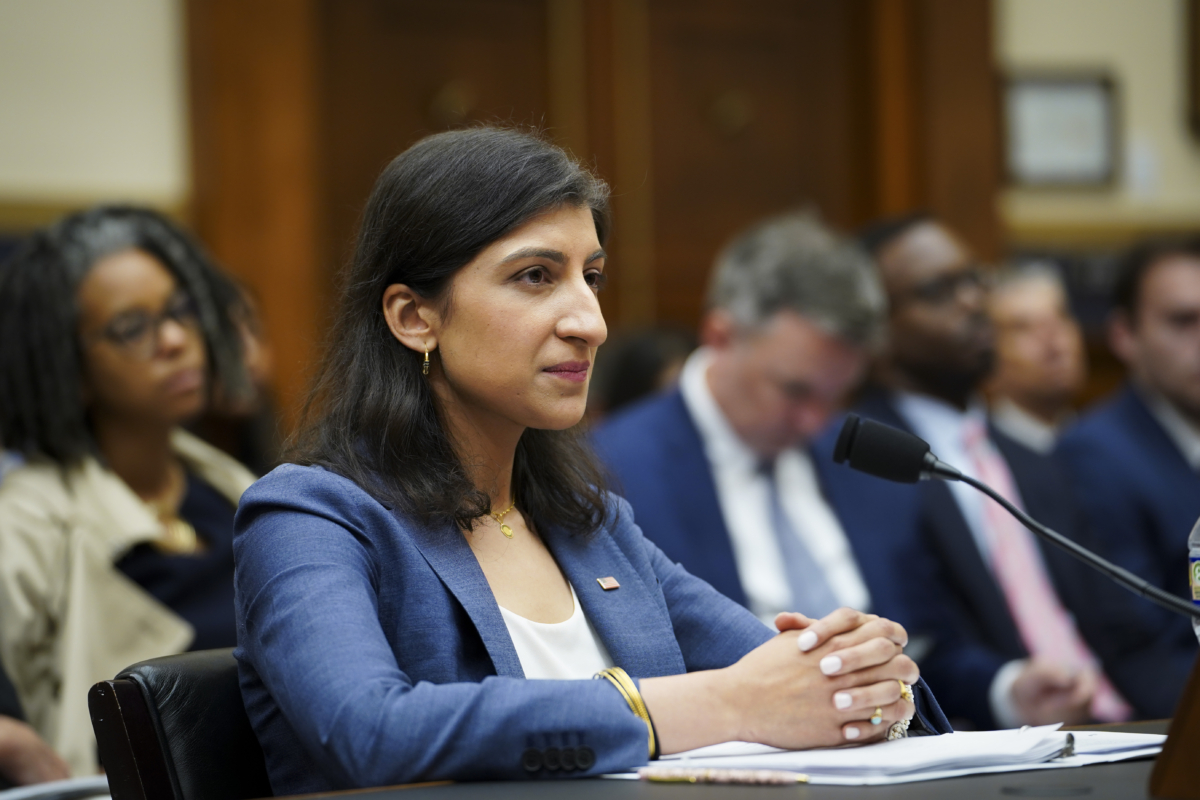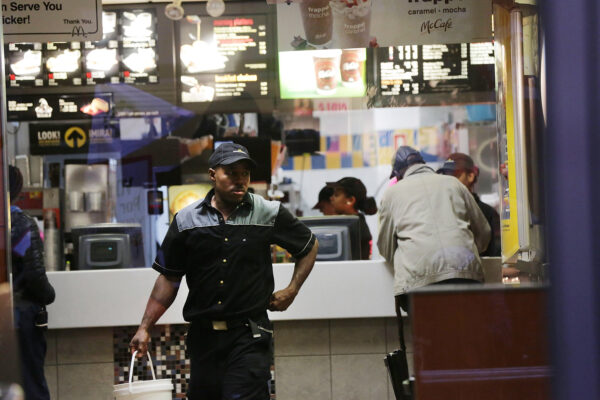


Federal Trade Commission (FTC) Chair Lina Khan doubled down on the agency’s proposal to eliminate non-compete clauses from employment contracts and fight junk fees.
The FTC in January released a proposal to prohibit non-complete clauses—a provision that prevents workers from leaving the firm to join a rival company within a specified period—that they say would bolster wages, increase competition, and lead to better market opportunities.
“Our proposal follows extensive research showing that non-competes harm competition and labor markets, creating mismatches between workers and firms and reducing wages even for workers not directly covered by non-competes,” Ms. Khan said in a speech at the Economic Club of New York on July 24.
“These clauses also impede entrepreneurial growth, depriving new firms of access to talent and dampening competition in product and service markets as well.”
Ms. Khan estimates that restricting non-competes in employment contracts would raise wages by up to $300 billion and slash health care spending by up to $150 billion.
President Joe Biden has made non-compete agreements a focal point of his economic agenda, dating back to the 2020 presidential campaign. He falsely claimed in July 2020 that McDonald’s “made you all sign non-compete contracts that you cannot go across town to try to get a job at Burger King.” The fast-food titan denied this accusation, confirming that it was incorrect that “hourly workers are or were required to sign non-compete agreements.”
The president also announced in his 2023 State of the Union address that his administration was banning non-compete agreements.
“Thirty million workers had to sign non-compete agreements when they took a job. So a cashier at a burger place can’t cross the street to take the same job at another burger place to make a couple bucks more,” Mr. Biden said. “Not anymore.”
Are non-compete agreements as prevalent as the White House suggests?
A 2019 Economic Policy Institute study found that close to one-third of private sector businesses require their employees to sign non-competes “regardless of pay or job duties.” The FTC suggests the figure is closer to one-fifth.
Critics say that this prevents low-wage workers from attempting to secure higher pay.
However, others have defended the use of non-compete clauses, arguing that businesses, especially in the tech industry, shield their intellectual capital by including this provision in employer agreements. In addition, experts purport that companies are willing to extend higher compensation to workers in exchange for non-compete clauses.
Another risk of eliminating non-compete clauses is the impact on productivity, a February 2020 research paper noted.
“A ban would risk falsely condemning procompetitive uses of non-competes and thereby reducing productivity and dampening the incentives to invest in trade secrets and to disseminate firm-specific knowledge widely among a firm’s workforce,” researchers at the Global Antitrust Institute at George Mason University wrote.
But while this might be more common for high-salary workers, does it really affect cashiers and line cooks at fast-food companies?
Fast-food chains do not block employees from working for their competitors. However, chains have restricted workers from transitioning to another franchise within the same company. This provision is known as a “no-poach” clause. But several industry chains, like Burger King, McDonald’s, and Popeyes, started eliminating this internal stipulation in 2017 and 2018.
A key scheme inside Bidenomics—Mr. Biden’s economic doctrine—has been consumer protection, with a focus on so-called junk fees.
The president has urged Congress to pass the Junk Fees Prevention Act, which was introduced in the House in April 2023. The legislation aims “to limit and eliminate excessive, hidden, and unnecessary fees imposed on consumers, and for other purposes.”
The White House estimates that so-called junk fees cost American consumers tens of billions of dollars each year.
“They take real money out of the pockets of families, and they can distort competition in many markets,” Lael Brainard, the director of the National Economic Council (NEC), said in a statement.
In June 2022, the FTC proposed a rule to “ban fraudulent junk fees.” Ms. Khan describes them as “unnecessary, unavoidable or surprise charges that appear, for example, when buying a hotel room or sports ticket.”
“As Taylor Swift Fans can most recently attest, even buying a concert ticket is now rife with hidden mystery fees and risks of a system-wide meltdown,” she said in her prepared remarks.
Small businesses are also victims of junk fees, Ms. Khan said.
“Small businesses across the country find themselves squeezed—not because customers don’t like their products, but because they’re unfairly muscled out of markets by big players,” she said. “At the FTC, we routinely hear from businesses across sectors from independent pharmacies to local grocers about the arbitrary fees, discriminatory pricing, and coercive tactics that they face at the hands of large firms.”
But experts, including economists at the Cato Institute, warn that reining in junk fees could pose long-term challenges and harm consumers by increasing headline prices and eliminating choice.
“This different pricing structure may redistribute money between different types of customers, but the total amount spent by U.S. households would be largely unchanged,” the libertarian-leaning think tank wrote. “Even in sectors where firms have market power, policing one component of pricing would not massively alter the industry’s dynamics, leaving the total price faced by consumers essentially unchanged. There’s no pot of gold here for regulation to transfer from businesses to U.S. households.”
Mary Sullivan, a former FTC economist and visiting scholar at the Regulatory Studies Center of George Washington University, purports these initiatives would be “counterproductive.”
“The proposed regulations may even be counterproductive, harming the very consumers that they are intended to help. A number of these regulatory efforts would also impose high compliance and administrative costs on firms,” Ms. Sullivan wrote in a recent report. “Some junk fees are genuinely harmful and deserve attention. Instead of initiating rulemakings for anything that might fit the description of a junk fee, though, regulators should carefully examine which fees are sufficiently harmful to justify the costs and consequences of new regulation.”
Jim Reuter, CEO of FirstBank, told the House Financial Services Subcommittee on Financial Institutions and Monetary Policy earlier this year that it is “confusing” as to why the federal government is targeting junk fees.
“Now, in fact, it’s quite confusing when the fees we are charging are clearly disclosed within compliance of the existing laws, that suddenly one person can interpret that a different way,” Mr. Reuter stated.
In a June 2023 letter to the Senate Commerce Committee’s Subcommittee on Consumer Protection, consumer advocacy group Consumer Reports argues that junk fees inflate and distort the cost of goods and services.
“Consumers are understandably fed up with the increasing number of costly junk fees they encounter whenever they make a purchase,” said Jonathan Schwantes, senior policy counsel for Consumer Reports. “These fees are more than just a nuisance; they can add up to thousands of extra dollars every year for the typical American family.”
Lawmakers need to defend consumers from “unfair and deceptive charges” by approving a bill to stop “hidden junk fees,” the letter added.
A February Navigator Research survey found that 75 percent of Americans supported the administration’s plan to crack down on hidden fees and charges, including 62 percent of Republicans and 64 percent of independents.


